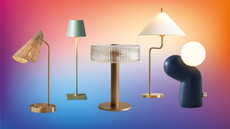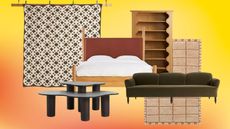Designer Profile: Tom Dixon
DO YOU HAVE A DESIGN MANTRA?
‘Extraordinary objects for everyday use’ is my mantra. I guess I’m trying to create a modern take on British design – whatever that looks like.
WOULD YOU DESCRIBE YOUR LOOK AS MASCULINE?
Well, I think I’ve got a feminine side, but I keep it well hidden! I’ve never been a big one for comfort. I’ve got the industrially produced things in the collection, like the car headlight-inspired pendant lamps, which are very masculine. As the collection gets bigger, I’m able to work in a couple of different aesthetics.

DO YOU HAVE ANY TIPS FOR DESIGNING HOME INTERIORS?
For me, successful designs are never ‘mono’. Too many designers have a mono aesthetic – your house should have a different feel in every room, from the bedroom, where it can be warm and soft, to the kitchen, which is a machine for manufacturing food. Shoreditch House is a good example of that. I like people to go through a sort of adventure, from space to space – like ghost trains, where you go through different events. Contrast is the key for any space, whether it’s texture, shape, colour or materials.

WHAT'S YOUR OWN HOME LIKE?
I’m not one to impose my designs on my family. I lived on my own for a long time when I was able to do that – I’ve even lived in my own studio. If you’re around your work 24 hours a day, it can be too much.
IS THERE A PIECE OF DESIGN YOU'D LOVE TO OWN?
I’m not very acquisitive – the more I design, the less I want things, really. But I like things like transport – I’ve got a Fifties Bentley that I’m currently restoring. It’s that type of thing that I covet – I like big objects.

WHO OR WHAT HAS INFLUENCED YOUR LOOK?
The people that have inspired me are engineers and sculptors. From Noguchi and Hepworth all the way to Anish Kapoor. And the more maverick engineers, like Eiffel – you can see the Pylon chair has taken direct influence from him.

WHICH DESIGNERS DO YOU ADMIRE?
When I joined Habitat, I went to see all of the masters – I met Castiglioni and Panton and lots of extraordinary people, just before they died. Philippe Starck is quite inspirational. It’s not that I like his stuff, but you have to admire his openness to the new and for being the only recognised designer in the world – ever.
WHAT WOULD YOU CONSIDER YOUR BREAKTHROUGH PIECE?
There are several career-changing objects, like the S-Chair that I did for Cappellini, which got into New York’s Museum of Modern Art. The Mirror Ball pendants kind of powered the company along for a little while, so that piece has actually allowed other ideas to flourish.

LIGHTING IS A BIG PART OF YOUR RANGE – WHAT IS IT ABOUT LIGHTING THAT INTERESTS YOU?
It’s partly the fact that I can use the latest technology and partly that I can be more radical. A lot of people feel unknowledgeable about lighting and maybe I help to simplify it. I think customers who are slightly conservative are more forgiving of innovation or crazy shapes than they would be with furniture.

YOU DESIGNED THE MONDRIAN LONDON HOTEL – WHAT WAS THE CONCEPT BEHIND THIS LOOK?
The original building is called Sea Containers House, so the idea was that the rooms were ship’s cabins – they’re relatively small spaces but with amazing views. But the main challenge was the furniture.
HOW SO?
The battering a hotel gets is unique – it’s like a new family moving into your house every day. I mean, it has to be able to be cleaned constantly and bullet- proof, basically. But it was a good lesson in how to make things robust and really thinking through every misuse things can be put to.

HOW WAS IT WORKING WITH JAMIE OLIVER ON HIS BARBECOA STEAKHOUSE?
Jamie’s a great guy, he’s very opinionated – he’s not hands off, but he’s not always there. Jamie’s fabulous to work with, but he was working alongside an American chef. So two chefs together – I wouldn’t recommend that for any interior designer!

YOU'VE ALSO DESIGNED THE SANDWICH CAFE IN HARRODS– WERE THERE MANY RESTRICTIONS WORKING WITH A DEPARTMENT STORE?
It came with a few restrictions, but we’re used to that. I don’t think that designers should complain about restrictions – we’re not making contemporary art, the restraint is the thing that makes it design. But I also like commerce. I’m sort of rare in that way – commerce is intrinsic to why I became a designer. I couldn’t believe that people would buy things that I made and that sort of legitimised the whole reason for doing it.
WHAT WOULD BE YOUR IDEAL NEXT PROJECT?
I haven’t done white goods, I haven’t done auto design... where do I start? There are lots of adventures left to have.
Learn more about Tom Dixon’s designs and interiors projects at tomdixon.net
Be The First To Know
The Livingetc newsletter is your shortcut to the now and the next in home design. Subscribe today to receive a stunning free 200-page book of the best homes from around the world.
The homes media brand for early adopters, Livingetc shines a spotlight on the now and the next in design, obsessively covering interior trends, color advice, stylish homeware and modern homes. Celebrating the intersection between fashion and interiors. it's the brand that makes and breaks trends and it draws on its network on leading international luminaries to bring you the very best insight and ideas.
-
 The 12 Best Table Lamps for Reading —I'm a Certified Bookworm (and Shopping Expert)
The 12 Best Table Lamps for Reading —I'm a Certified Bookworm (and Shopping Expert)When it comes to table lamps for reading, I don't mess around. If you're the same, this edit is for YOU (and your books, or course — and good recommendations?)
By Brigid Kennedy Published
-
 "It's Scandi Meets Californian-Cool" — The New Anthro Collab With Katie Hodges Hits Just the Right Style Note
"It's Scandi Meets Californian-Cool" — The New Anthro Collab With Katie Hodges Hits Just the Right Style NoteThe LA-based interior designer merges coastal cool with Scandinavian simplicity for a delightfully lived-in collection of elevated home furnishings
By Julia Demer Published

